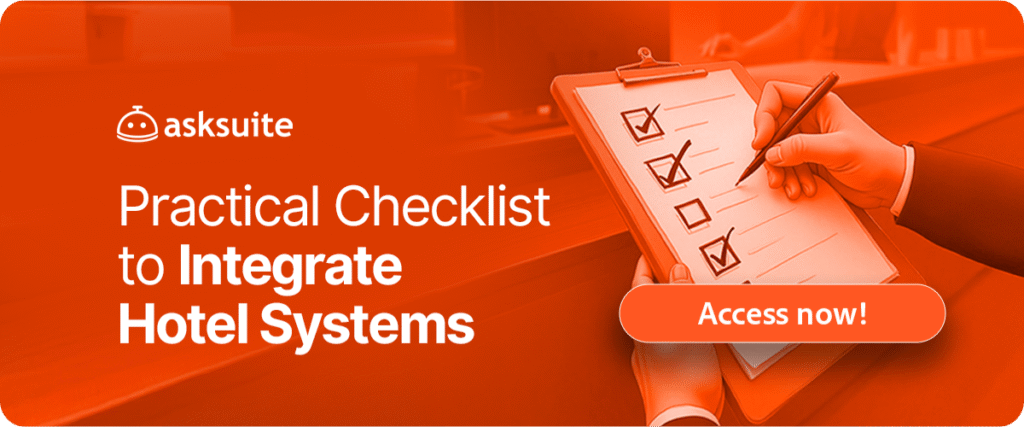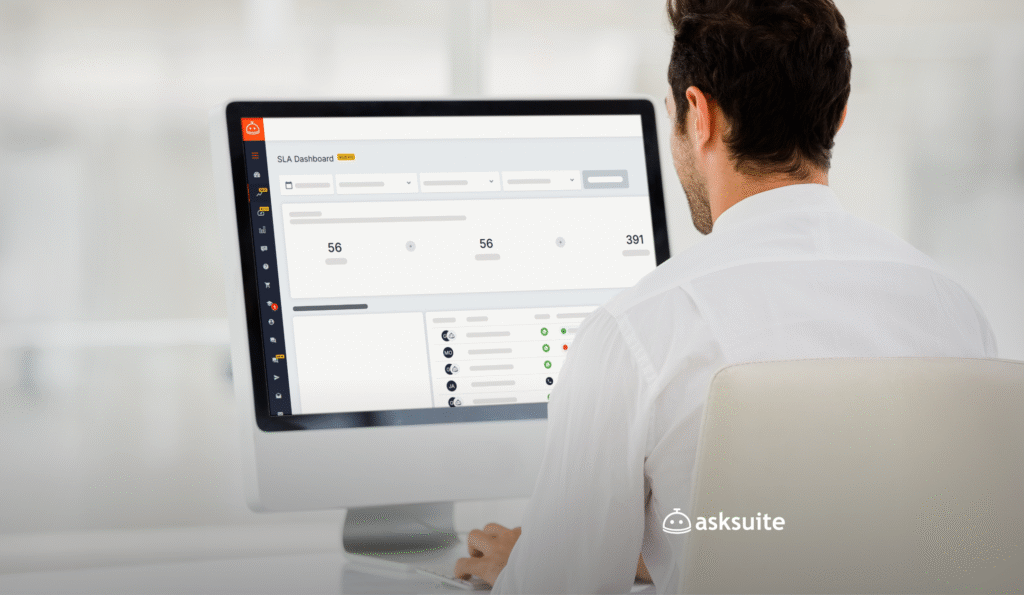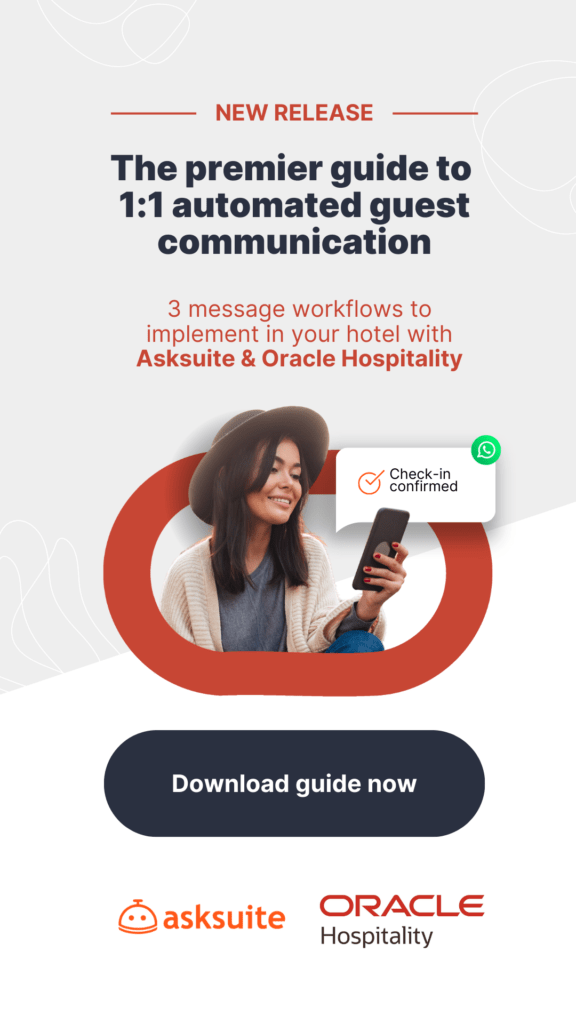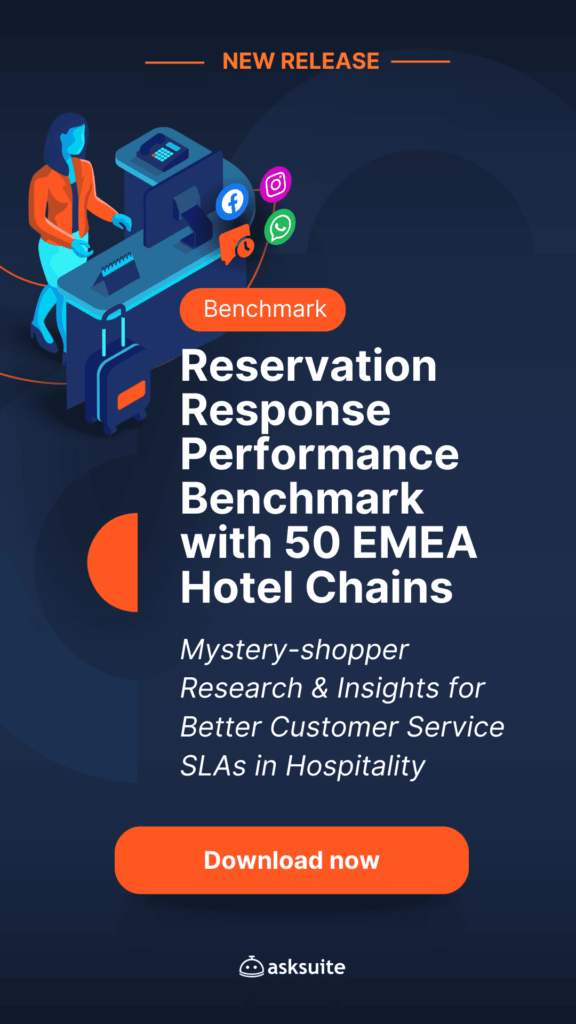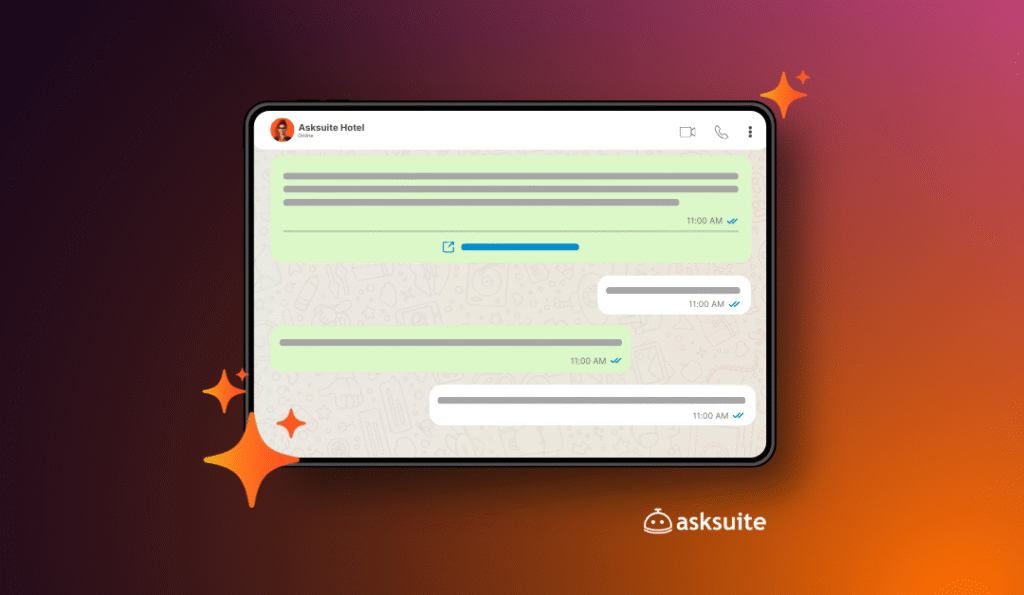Data analytics in the hospitality industry is already guiding hotels in making smarter, faster decisions. Combined with AI and other tech solutions, it drives higher bookings, operational efficiency, and personalized guest communication.
The hospitality industry is under increasing pressure to deliver measurable results—faster booking conversions, leaner operations, and better communication. As competition intensifies and travelers become more selective, data analytics in the hospitality industry and AI are no longer buzzwords, but operational imperatives.
According to McKinsey, companies that rely on data-driven decisions are 19 times more likely to be profitable and 23 times more likely to acquire customers. In hospitality, where the sales cycles are complex, this can translate into significant performance gains. From understanding the traveler behavior patterns to tracking real-time booking trends across channels, advanced data analytics allows hoteliers to move from reactive to predictive management.
But analytics alone isn’t enough. The real leap happens when AI is integrated into that data workflow—automating analysis, detecting anomalies, personalizing communication, and recommending next steps. Tools like smart dashboards and AI-powered messaging flows aren’t just simplifying operations—they’re increasing revenue and guest satisfaction by acting on real-time insights.
In this article, we explore how data analytics and AI are reshaping decision-making in the hospitality industry, with practical applications in hotel operations, marketing, and guest experience.
What Is Data Analytics in the Hospitality Industry?
Data analytics in hospitality refers to the systematic collection, processing, and interpretation of hotel-related data—ranging from booking patterns and website behavior to operational KPIs and guest feedback. Its purpose is not only to report what happened, but to reveal trends, inefficiencies, and revenue opportunities that would be difficult to detect manually.
Traditionally, hotel managers relied on spreadsheets and isolated PMS or booking reports to evaluate performance. Today, modern hospitality analytics tools consolidate data from multiple sources (CRM, booking engines, chat systems, payment platforms) into centralized dashboards, allowing hotel teams to make informed decisions faster and more strategically.
Have you heard the news? Asksuite has just launched the Sales Performance Dashboard. Hotel managers are now able to track the performance of both human agents and AI in real time! Click here to learn more details in this exclusive article.
But the true value emerges when analytics is combined with artificial intelligence. AI enhances data analytics in three critical ways:
- Real-time processing: AI systems can ingest and process large volumes of data continuously, rather than in batch reports. This enables instant alerts on drops in conversion rates, underperforming channels, or missed upsell opportunities.
- Pattern recognition: Machine learning algorithms can identify guest behavior trends (such as when and how guests are most likely to book or cancel) and recommend actions automatically—adjusting rates, triggering follow-up messages, or flagging leads for the sales team.
- Insight automation: Instead of relying on analysts to interpret data manually, AI can generate contextual recommendations for operational teams, from front desk to marketing, making analytics accessible to non-technical users.
In short, data analytics powered by AI helps hotels shift from static reporting to dynamic decision-making. It moves the focus from past performance to future performance—answering not only “what happened,” but “what should we do next?”
As competition for direct bookings increases, this level of intelligence is a game-changer. It’s a foundational part of how high-performing hospitality teams operate.
Which Areas are the Most Impacted by Data analytics in Hotel Operations?
As hospitality operations grow more complex—with multi-channel communication, fluctuating demand, and increasingly personalized guest expectations—the ability to track, interpret, and act on performance data has become a competitive necessity. Hotels that use data analytics in tandem with AI are not just optimizing isolated processes, they are building systems that learn, adapt, and drive measurable results.
From revenue management to communication, data-backed decisions are redefining how hotels operate daily. Below, let’s discover the specific areas where analytics and AI are generating the most operational impact.
Improving Booking Conversion Rates with Sales Dashboards
One of the most immediate and tangible applications of data analytics in hospitality is in increasing direct booking conversion rates. A growing number of hotels are using real-time sales dashboards to track their performance and adjust strategies proactively—moving from reactive management to continuous optimization.
The Sales Performance Dashboard, recently released by Asksuite, is a solid example of this evolution. It consolidates performance data across the most relevant communication channels and provides granular visibility into metrics like:
- Conversion rate per channel
- Performance by agent (human or AI)
- Volume and success of campaigns tagged by date, promotion, and event
- Sales cycle bottlenecks in the booking journey
What sets this dashboard apart is its instantaneous processing and flexibility. Hotel managers can filter performance by date range, agent, tag, unit, or channel—generating actionable insights in seconds and identifying exactly where and when conversion issues are happening.
The role of AI in the direct booking context is not to replace agents, but to enhance the team’s ability to act. Conversational AI can handle initial inquiries, qualify leads instantly, and collect structured data across thousands of conversations. This structured input feeds into the dashboard, giving human agents high-quality context to continue the sales process more efficiently and strategically.
By combining AI automation with human expertise, hotels build a collaborative model where the intelligence generated by machines becomes an asset for people—not a replacement. This synergy allows hotel teams to shift from generic responses to personalized, data-driven engagement that moves travelers further down the booking funnel.
Personalizing Guest Communication Based on Data
Personalization is no longer a luxury—it’s an operational standard. But doing it at scale is impossible without structured data and hospitality-driven tech tools. This is where the convergence of data analytics and smart automation redefines how hotels engage with travelers before, during, and after their stay.
Asksuite’s AskFlow is a prime example of how this works in practice. By connecting with PMS, CRM, and other third-party systems, AskFlow allows you to build intelligent, automated communication workflows triggered by booking data, traveler behavior, and past interactions.
With AskFlow, hotels can automate highly relevant, personalized messages based on variables such as:
- Check-in /-out dates (e.g., sending arrival instructions two days prior to check-in)
- Booking channel (e.g., exclusive offers for direct bookers)
- Traveler profile (e.g., promoting romantic packages to couples)
These data-driven automations deliver measurable benefits:
- Reduce manual workload for the reservations team
- Increase open messages and response rates
- Improve guest satisfaction by making communications more relevant
- Unlock new upsell and loyalty opportunities
The value here is not just in responding to guests, but in anticipating their needs. AskFlow sends the right message, to the right customer at the right time—while human agents focus on high-value interactions that require empathy and strategic insight.
The result? A communication process that is more efficient, personalized, and directly tied to revenue growth.

Optimizing Marketing ROI through Attribution Modeling
Hotels often operate in a complex marketing ecosystem, investing across multiple channels—from metasearch engines to paid social media and direct email campaigns. Yet without a robust attribution model, it’s difficult to quantify which touchpoints are actually driving direct bookings and which ones are simply consuming budget.
Data analytics, particularly when paired with AI-powered attribution modeling, allows hotel marketers to move beyond last-click assumptions and toward more accurate performance assessments. This means understanding the full booking journey—from first interaction to final conversion—across both online and offline channels.
For example:
- A guest might first interact with a hotel on Instagram, receive a promotional email a week later, and finally convert after clicking a retargeting ad on Google.
- Traditional analytics might credit only the final click, but an AI-enhanced model can distribute value across all touchpoints using methods like data-driven attribution or Shapley values.
This granular visibility empowers hoteliers to:
- Identify which channels and campaigns are contributing most effectively to direct bookings.
- Adjust budget allocation based on actual contribution, not assumptions.
- Test messaging and offers more intelligently by analyzing conversion lift across segments.
- Reduce dependency on high-commission platforms by optimizing high-ROI owned channels.
Asksuite’s Sales Performance Dashboard is designed to support this kind of insight by allowing hoteliers to filter performance by campaign tags, channel source, and even individual agents. Combined with AskFlow automations, you can monitor how specific campaigns impact message volume, lead quality, and eventual conversion—closing the loop between marketing and operations.
When data analytics and tech solutions converge in attribution modeling, marketing stops being a cost center and becomes a revenue engine. Instead of relying on gut feelings or broad averages, hoteliers can finally tie investments to outcomes with precision—and scale what works.
What are the Benefits of Data-Driven Decision Making in Hospitality
In a high-stakes industry like hospitality, where small operational inefficiencies can result in lost revenue or poor guest experiences, relying on guesswork is no longer sustainable. Data-driven decision making enables hotel teams to act on facts, not assumptions — fostering a culture of precision, accountability, and continuous improvement across departments.
Here are 5 concrete benefits of using data as the foundation for strategic and operational decisions:
1. Evidence-Based Action, Not Intuition
Hospitality managers often operate under pressure, needing to make rapid decisions about staffing, pricing, and service delivery. With a centralized analytics structure, those decisions are backed by relevant data — not gut feelings. This leads to better resource allocation and more accurate forecasts for demand, occupancy, and staffing.
2. Reduction of Operational Waste
Data analytics helps pinpoint inefficiencies across departments — from low-converting distribution channels to unused inventory in upselling offers. By analyzing historical data and live performance metrics, hoteliers can optimize workflows, streamline team activities, and reallocate the budget from underperforming initiatives.
3. Higher Booking Conversion Rates
When you track performance by agent, campaign, or channel, patterns become clear: you can see what’s working, what needs intervention, and where opportunities are being missed. This visibility drives more intentional coaching and faster iteration on sales strategies — especially when supported by tools like the Sales Performance Dashboard.
4. Improved Traveler Experience
From response times to personalized offers, data insights help tailor every touchpoint of the traveler journey. The result is more relevant, timely, and consistent communication that reduces friction and increases traveler satisfaction — and ultimately, repeat bookings.
5. A Culture of Performance Across Teams
When data is accessible and actionable, it becomes a shared language across teams — not just a responsibility of the marketing or operations department. Sales, front desk, and management teams can align clear goals, measure what matters, and celebrate performance based on transparent KPIs.
In short, data transforms hospitality operations from reactive to proactive — enabling hotels to scale efficiently while delivering consistent excellence.
How to Start Using Data Analytics in Your Hotel? Practical Checklist for Hospitality Teams
Adopting data analytics doesn’t require a complete tech overhaul from day one. It starts with organizing what you already have and building the right foundation for smart, scalable decisions.
Here’s a practical checklist to guide your hotel team through the first steps:
- Centralize Traveler, Booking, and Channel Data
Break down silos between your reservation system, contact channels, and CRM. Create a single source of truth to monitor interactions from the first contact to post-stay feedback.
- Invest in Hospitality-Tailored AI Tools
Use tools specifically designed for hotels’ needs. Besides reducing your team’s manual workload, these solutions can intelligently track agents and channel performance in real time. A good tool helps you spot bottlenecks, understand conversion gaps, and generate executive reports in seconds.
Want to learn more about the hoteliers’ choice and #1 AI Reservation Agent in the world? Talk to one of our specialists today!

- Map Your Key Performance Indicators (KPIs)
Define the metrics that matter most for your operation — such as response time, lead-to-booking rate, upsell conversions, and guest satisfaction. Make sure your analytics tools support filtering by agent, campaign, channel, or hotel group.
- Implement Automation Tools Like AskFlow
Use AskFlow to create data-triggered communication flows: pre-check-in messages based on reservation date, campaigns segmented by profile, and post-stay surveys to gather insights at scale.
Is your team still sending every message manually? Get to know AskFlow!
- Build a Data-Driven Culture Across the Team
Data is only useful if your team understands and uses it. Share dashboards in team meetings, train staff to interpret performance indicators, and celebrate improvements driven by analytics. The goal: make performance visibility part of your daily operations.
Is Your Hotel Leading the Way in Data Analytics in the Hospitality Industry?
In an increasingly competitive and dynamic industry, data alone is no longer enough. The true differentiator lies in how hotels leverage tech and AI to transform raw information into actionable decisions — ones that directly improve guest satisfaction, increase conversion rates, and enhance operational efficiency.
By integrating specialized tools, hospitality teams gain more than visibility — they gain control. From personalized communications that drive revenue to real-time dashboards that pinpoint sales bottlenecks, data analytics enables hotel leaders to act faster and smarter.
The result? A more profitable operation, a more engaged team, and travelers who feel seen, understood, and better served.
Hotels that embrace a data-driven mindset today are not just keeping up — they’re setting the pace.
Want to stay ahead by using the right tools to connect your hotel systems and unlock the full potential of data analytics?
Download the Practical Checklist to Integrate Hotel Systems and make sure your tech works in sync to boost efficiency and drive more direct bookings.
